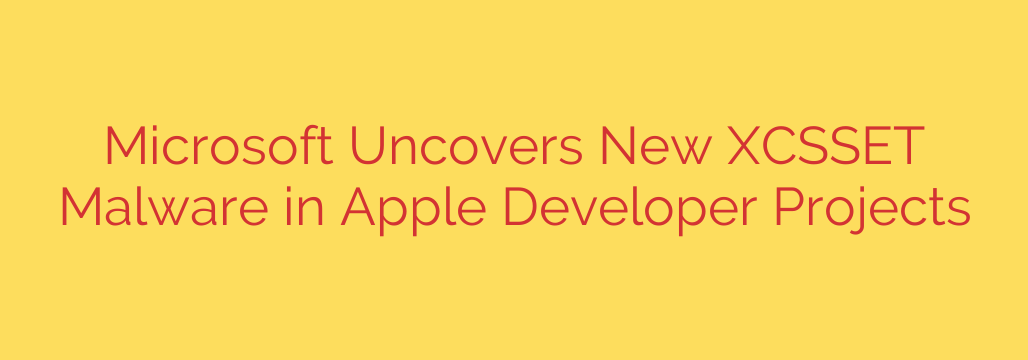
New XCSSET Mac Malware Targets Developers Through Infected Xcode Projects
A sophisticated and dangerous strain of malware is actively targeting Apple developers, turning a trusted development environment into a gateway for cyberattacks. Known as XCSSET, this malware uses a cunning strategy to infect macOS systems by hiding within seemingly legitimate Xcode projects.
This attack vector represents a significant threat because it targets the very creators of the software we use daily. By compromising a developer’s machine, attackers can steal sensitive data, deploy ransomware, and potentially inject malicious code into other applications, creating a dangerous supply-chain risk.
How the XCSSET Malware Spreads
The primary infection method for XCSSET is through compromised Xcode projects shared on platforms like GitHub. Here’s how the attack unfolds:
- A developer downloads a malicious or trojanized Xcode project from a public repository.
- The project contains hidden, malicious code designed to execute when the project is built.
- When the developer builds the project in Xcode, the malicious scripts run automatically, infecting the developer’s Mac.
This technique is particularly insidious because it exploits the collaborative nature of software development. Developers frequently use and share open-source projects, and this malware turns that trust into a vulnerability. Once a machine is infected, the malware can then spread itself to other local Xcode projects, continuing the cycle of infection.
A Multi-Faceted Threat: What XCSSET Can Do
Once it has infiltrated a system, XCSSET is capable of a wide range of malicious activities. It is not a one-trick pony; it’s a comprehensive spyware and data theft tool.
Its key capabilities include:
- Stealing Browser Cookies: The malware can extract cookies from the Safari browser. This allows attackers to hijack active user sessions for various websites, potentially gaining access to personal accounts, financial information, and corporate networks without needing a password.
- Injecting Malicious JavaScript: XCSSET can inject malicious JavaScript code into websites the victim is currently visiting. This can be used to modify websites, steal login credentials, capture credit card information, and trick users into downloading more malware. It has universal cross-site scripting (UXSS) capabilities, making it highly effective.
- Targeting Specific Applications: The malware is designed to steal credentials and personal data from a variety of popular apps, including Evernote, Notes, Skype, Telegram, and WeChat.
- Capturing Screenshots: Like many forms of spyware, XCSSET can take screenshots of the user’s desktop, capturing sensitive information that may be on screen at any given time.
- Deploying Ransomware: Analysis of the malware has revealed a module for file encryption. This means an infected machine could suddenly have its files locked, with attackers demanding a ransom payment for their release.
Why Developers are a High-Value Target
Cybercriminals are increasingly focusing on developers for several critical reasons. Developers’ computers are treasure troves of valuable information, including:
- Source code and intellectual property.
- API keys, passwords, and other credentials.
- Access to corporate servers and production environments.
By compromising a single developer, an attacker can gain a foothold into an entire organization. Furthermore, by infecting the developer’s projects, they can potentially spread their malware to the countless end-users who will eventually download and run the developer’s legitimate applications.
How to Protect Yourself and Your Projects
For Mac users, and especially developers, staying vigilant is crucial. The traditional belief that “Macs don’t get viruses” is dangerously outdated. Here are some actionable steps you can take to protect your system:
- Vet All Third-Party Code: Be extremely cautious when downloading Xcode projects from unverified or untrusted sources. Always scrutinize code from public repositories before building it on your machine.
- Audit Your Dependencies: Regularly check the dependencies and scripts included in your projects. Look for any unusual or obfuscated code that could be hiding malicious commands.
- Use Endpoint Security: Employ a reputable anti-malware and security solution for macOS. Modern security software can detect and block threats like XCSSET before they can cause damage.
- Monitor for Suspicious Activity: Keep an eye out for unusual processes running on your Mac, unexpected network connections, or strange behavior within your applications.
- Isolate Development Environments: Whenever possible, use virtual machines or containers for testing un-vetted code to prevent it from accessing your primary system.
The emergence of threats like XCSSET is a stark reminder that no platform is immune to attack. Developers must adopt a security-first mindset to protect not only their own data but also the integrity of the software ecosystem they help build.
Source: https://go.theregister.com/feed/www.theregister.com/2025/09/26/microsoft_xcsset_macos/








